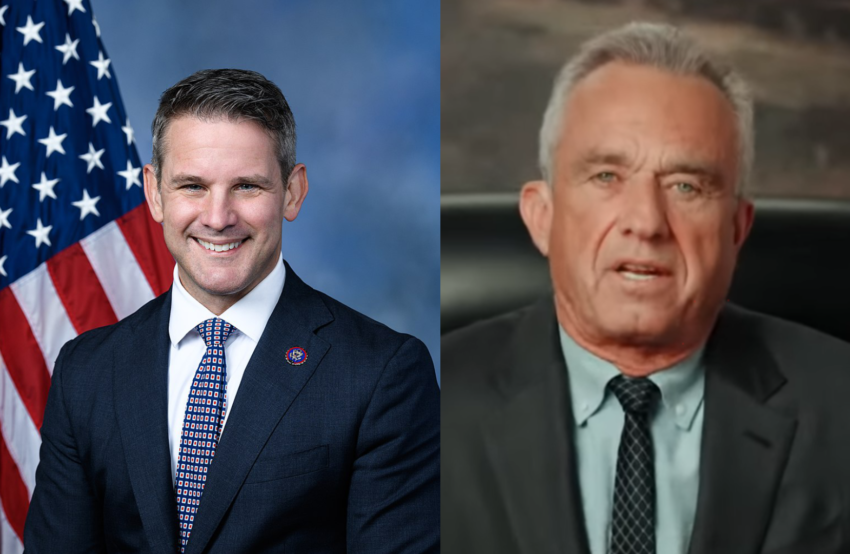| Listen to our audio presentation: History of Russia |
Former Representative Adam Kinzinger has criticized independent presidential candidate Robert F. Kennedy Jr., claiming his campaign is aligned with MAGA supporters, especially after Kennedy’s remarks on the Jan. 6 Capitol riot. Kennedy’s campaign issued a controversial statement calling the rioters “activists” and decrying their prosecution as an “outrageous miscarriage of justice.” This statement drew backlash, leading to a campaign spokesperson clarifying that the language used was mistakenly included by a new contractor.
Kinzinger, in an interview with CNN, expressed concern over Kennedy’s narrative, suggesting it aligns with conspiracy theories often associated with Donald Trump’s supporters. He disputed Kennedy’s claims, emphasizing the established democratic principles upheld by current President Joe Biden, contrasting them with the allegations against Trump.
Further complicating matters, Kennedy’s ambiguous stance on the Capitol riot has sparked criticism. Despite backtracking on the initial statement, he conveyed a mixed message, indicating he has yet to form a clear view on the event. He mentioned receiving diverse opinions, highlighting the complexity and polarization surrounding Jan. 6. Kennedy also hinted at potential political motives behind the prosecution of the rioters, reflecting a broader skepticism of governmental actions against political adversaries.
The Capitol riot on January 6, 2021, remains a divisive event in American politics. Initially, it was widely condemned as an insurrection aimed at overturning the 2020 election results. Over time, narratives around the event have evolved, with some factions downplaying the severity and others emphasizing the threat to democracy. The clash between Kinzinger and Kennedy illustrates the ongoing debate over how to interpret and respond to the events of that day. This incident underscores the broader political polarization in the U.S. and the complexities of addressing the nation’s democratic processes and rule of law.
Robert F. Kennedy Jr.
Robert F. Kennedy Jr., a prominent figure in American politics and environmental advocacy, has been a vocal critic of various government policies and corporate practices. As an environmental lawyer and activist, Kennedy’s career is marked by his strong opinions and activism. He founded the Children’s Health Defense, a group, that has expressed skepticism about the COVID-19 pandemic, suggesting it disproportionately benefited the wealthy.
Kennedy’s political views are varied. He has criticized corporate influence in American politics, arguing that it has led to a systematic erosion of the middle class. He supports increased taxes on the wealthy and corporations, aligning with progressive tax proposals. His foreign policy stance is equally complex; he has condemned U.S. alliances with dictatorships and criticized foreign interventions, yet he offers nuanced views on conflicts like the Russia-Ukraine war.
On environmental issues, Kennedy positions himself as a leading figure, advocating for the Green New Deal and opposing nuclear energy. He criticizes the influence of big business on climate policy and supports regenerative farming practices. His comments on gun control and abortion reveal a desire to balance constitutional rights with public policy considerations.
Kennedy’s involvement in politics dates back to his support for various Democratic campaigns, including those of Al Gore and John Kerry. Despite controversies and criticisms, including his stance on vaccines and election integrity, Kennedy remains a significant and complex figure in the American public sphere.
Robert F. Kennedy Jr.’s career highlights the intricate relationship between personal legacy, political activism, and public perception. As a member of the Kennedy family, his actions and statements carry the weight of historical significance, drawing attention and scrutiny. His advocacy for environmental issues, criticism of corporate power, and controversial views on vaccines and election integrity demonstrate the challenges of navigating public life as a figure associated with a powerful political legacy. His career offers insights into the dynamics of American political and environmental discourse, reflecting broader debates about democracy, public health, and the environment.
Adam Kinzinger
Adam Kinzinger, a former U.S. Representative from Illinois and a senior political commentator for CNN, has had a notable career in American politics, characterized by his transition from a Republican congressman to an outspoken critic of his own party. Kinzinger’s political journey began with his election to Congress in 2010, representing Illinois’s 11th district before moving to the 16th district post-redistricting. His tenure in Congress saw him take firm stances on key issues, including his vocal opposition to Donald Trump’s claims of voter fraud and the Capitol attack on January 6, 2021.
Kinzinger’s criticism of Trump escalated following the 2020 presidential election, culminating in his vote to impeach Trump and his participation in the committee investigating the January 6 Capitol attack. These actions led to his censure by the Republican National Committee, which labeled the Capitol riot as “legitimate political discourse.” In his farewell address, Kinzinger lamented the shift he perceived within the Republican Party, criticizing its departure from traditional values toward embracing conspiracy theories and extremism.
After deciding not to seek reelection in 2022, Kinzinger joined CNN as a senior political commentator, continuing his role as a critical voice in American political discourse. His commentary focuses on the challenges facing democracy in America, including the rise of authoritarianism and the influence of misinformation.
Adam Kinzinger’s political career and subsequent role as a commentator highlight the growing factionalism within the Republican Party and the broader American political landscape. His outspoken stance against Trump and involvement in the investigation of the Capitol riot represent significant moments in recent political history, reflecting the deep divisions and tensions that define current American politics. Kinzinger’s experiences and observations offer valuable insights into the challenges and transformations within the Republican Party and the ongoing debate over democracy and truth in the political arena.

